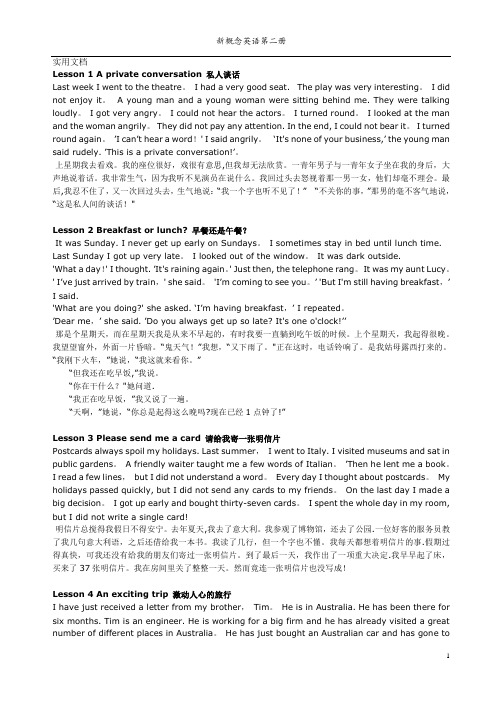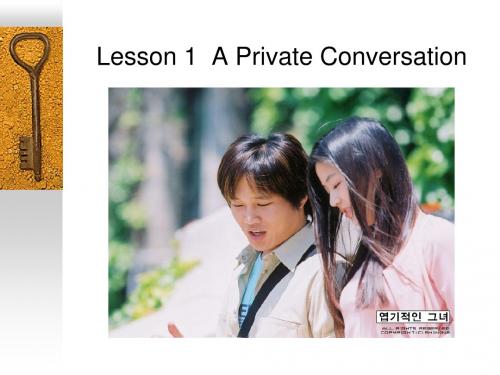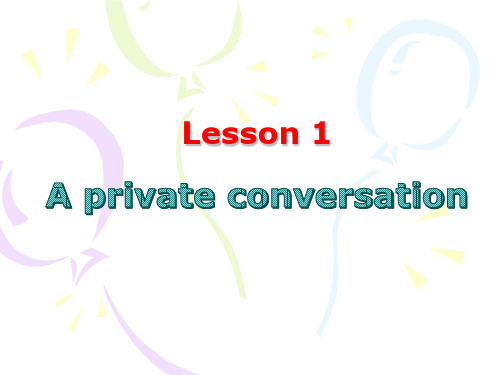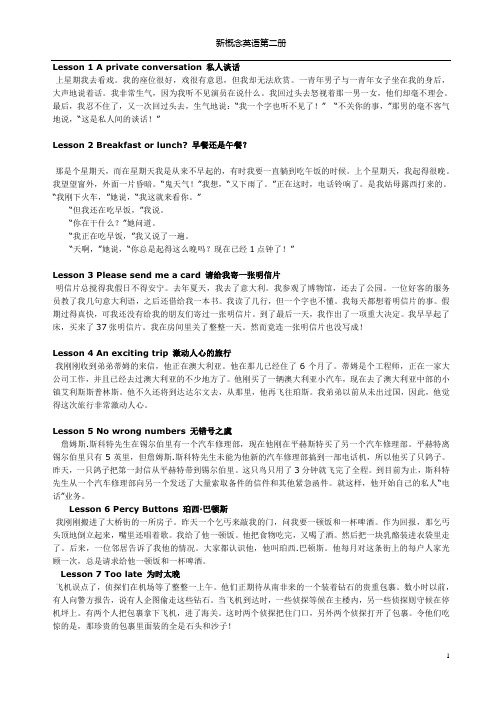新概念英语第二册1
新概念英语第二册lesson1

• business n.
• ①贸易,商业,买卖(trade, commerce, buying and selling)
• do business 做生意 • be on business 出差
• ②事情,事物(matter; affair) • It's none of your business. 不关你的事。 • Mind your own business. 管好你自己的事就行了。
可以指时间也可以指空间。 • 13、I could not bear it! 我实在受不了了!这是一句非常有用的
习惯用语。 • bear = stand忍受、容忍。it代指这整件事。
• 简单陈述句的语序(Word order in simple statements)
• attention
• n. 注意
• pay attention to sb/sth 对……给予注意
• pay some attention to sb/sth 给予一定的注意
• pay great attention to sb/sth 给予极大的注意
• pay no attention to sb/sth 根本不注意,毫不理会
• draw one's attention 吸引……注意力 • eg. The new type of computer draws our attention. 新款
计算机吸引了我们的注意力。
• bear (bore, borne)
• ①n. 熊,粗鲁蛮横的人 • a bear hug 紧紧地拥抱(熊抱) • bear's service 帮倒忙,好心做坏事
• 1 go to the theatre,去看戏。 • 2 got angry,生气。 • 3 turn round,转身,也可用turn around。 • 4 pay attention,注意。 • 5 I could not bear it.我无法忍受。 其中的it是指上文中
新概念英语第二册课文(中英文对照)

Lesson 1 A private conversation 私人谈话Last week I went to the theatre。
I had a very good seat. The play was very interesting。
I did not enjoy it。
A young man and a young woman were sitting behind me. They were talking loudly。
I got very angry。
I could not hear the actors。
I turned round。
I looked at the man and the woman angrily。
They did not pay any attention. In the end, I could not bear it。
I turned round again。
’I can’t hear a word!' I said angrily。
‘It's none of your business,’ the young man said rudely. ’This is a private conversation!’。
上星期我去看戏。
我的座位很好,戏很有意思,但我却无法欣赏。
一青年男子与一青年女子坐在我的身后,大声地说着话。
我非常生气,因为我听不见演员在说什么。
我回过头去怒视着那一男一女,他们却毫不理会。
最后,我忍不住了,又一次回过头去,生气地说:“我一个字也听不见了!” “不关你的事,”那男的毫不客气地说,“这是私人间的谈话!"Lesson 2 Breakfast or lunch? 早餐还是午餐?It was Sunday. I never get up early on Sundays。
I sometimes stay in bed until lunch time. Last Sunday I got up very late。
新概念英语第二册_lesson_1

attention
[经典用法] pay attention to sb/sth
[比较学习]
notice
不用心去看 attention 用心去盯着 [口语应用] Attention, please! 请大家注意! Attention! 立正! At ease! 放松!
1. Last week I went to the theatre.
[参考翻译] 上个星期,我去了戏院看戏。
[语言点1] 时间状语开门见山,过去的时
间用过去时态顺理成章。故将go改为 went。 [语言点2] 在theatre,cinema,pictures等词 之前一定要加定冠词the。
3. The play was very interesting.
[参考翻译] 那场戏剧演得非常有意
思。 [语言点] very 为副词,interesting为 形容词,副词修饰形容词一般放在 其前面。 比如: very hot非常热, quiet easy 十分简单,但good enough 为例外。
with sb I had a long conversation with my father yesterday afternoon. have a conversation about sth Shall we have a conversation about your vacation ?
例如:
go to the theatre = go to the play去看戏 go to the cinema 去看电影(英式英语) go to the movies 去看电影(美式英语) go to the pictures/films 去看电影 be at the theatre/cinema 在戏院看戏/在
新概念英语第二册 Lesson 1

• 位置:
• ①形容词+名词
• ②系动词+形容词 哪些是系动词?
• ③不定代词之后(后置定语)
• a __________ girl一个幸运的女孩
• The girl is____________(lucky,luckily).
• 2.副词:用来修饰动词,形容词,其他副词或句
子,说明时间,地点,程度及方式。
Do you enjoy living here?
Languague Points
4. get very angry 变得非常生气 → get 变得,强调变化(系动词) The holiday is getting closer. ☆系动词(常见:become、feel、sound、turn、smell、taste等)
注意: 在运动项目的前面不加定冠词"the"
play cards play chess play basketball
play the violin 注意:
n. 戏剧,剧本 在乐器的前面加"the"
TV play soap play no play 没戏了
5.loudly adv. 大声的
She called loudly for help.
• clothes and shoes.( surprise) • 8. Take a _______, please. (sit)
1.private
• adj. personal
• 1)私人的,常做定语修饰名词 • a private conversation 私人谈话 • private life 私生活 • 2)秘密的 secret • a private place = a secret place • private — public adj. 公众的,公开的 • in private 私自得 • in public 公开得
新概念英语第二册 Lesson 1

private ['praɪvɪt]
n.谈话
conversation [kɒnvə'seɪʃən]
n.剧场,戏院
theatre ['θɪətə]
n.座位
seat [si:t]
n.戏
play [pleɪ]
adv.大声地
loudly ['laʊdlɪ]
adj.生气的
angry ['æŋgrɪ]
angry adj. 生气的 be angry with sb. 对某人生气 anger n. angrily adv. 生气地 I looked at the man and the woman angrily.
I could not hear the actors.
could not 缩略式couldn’t
影院看电影
I had a good seat.
seat (这个词很重要,经常考查)
have a good seat,这里的seat指place(指地方不错),而 不是chair.相当于Maybe I sat in the front of the theatre. 也许是我坐在戏院的前面,所以说座位很好。
A private conversation
private: adj. 私人的 Don’t tell the others, because this is private. = It's just between you and me. private school私立学校 public school公立学校 He supported the plan in public, but in private he knew it was not good. in private 私下里; in public 公众地 — How old are you? — ①Sorry, this is a private question. — ②I forgot it.
新概念英语第二册课文(中英文对照)

Lesson 1 A private conversation 私人谈话上星期我去看戏。
我的座位很好,戏很有意思,但我却无法欣赏。
一青年男子与一青年女子坐在我的身后,大声地说着话。
我非常生气,因为我听不见演员在说什么。
我回过头去怒视着那一男一女,他们却毫不理会。
最后,我忍不住了,又一次回过头去,生气地说:“我一个字也听不见了!” “不关你的事,”那男的毫不客气地说,“这是私人间的谈话!”Lesson 2 Breakfast or lunch? 早餐还是午餐?那是个星期天,而在星期天我是从来不早起的,有时我要一直躺到吃午饭的时候。
上个星期天,我起得很晚。
我望望窗外,外面一片昏暗。
“鬼天气!”我想,“又下雨了。
”正在这时,电话铃响了。
是我姑母露西打来的。
“我刚下火车,”她说,“我这就来看你。
”“但我还在吃早饭,”我说。
“你在干什么?”她问道。
“我正在吃早饭,”我又说了一遍。
“天啊,”她说,“你总是起得这么晚吗?现在已经1点钟了!”Lesson 3 Please send me a card 请给我寄一张明信片明信片总搅得我假日不得安宁。
去年夏天,我去了意大利。
我参观了博物馆,还去了公园。
一位好客的服务员教了我几句意大利语,之后还借给我一本书。
我读了几行,但一个字也不懂。
我每天都想着明信片的事。
假期过得真快,可我还没有给我的朋友们寄过一张明信片。
到了最后一天,我作出了一项重大决定。
我早早起了床,买来了37张明信片。
我在房间里关了整整一天。
然而竟连一张明信片也没写成!Lesson 4 An exciting trip 激动人心的旅行我刚刚收到弟弟蒂姆的来信,他正在澳大利亚。
他在那儿已经住了6个月了。
蒂姆是个工程师,正在一家大公司工作,并且已经去过澳大利亚的不少地方了。
他刚买了一辆澳大利亚小汽车,现在去了澳大利亚中部的小镇艾利斯斯普林斯。
他不久还将到达达尔文去,从那里,他再飞往珀斯。
我弟弟以前从未出过国,因此,他觉得这次旅行非常激动人心。
新概念英语第二册Lesson1

Part4. Summary Writing 常见疑问句提问内容和回答方式 1. Where....: 询问地点。
回答时可以直接写地点或在句子末尾加地点。 2. Who..:询问人物
回答时可以给出人物名称 3. What...: 询问内容
回答时给出具体内容或者用名词回答 4. When...:询问时间
last month/year/morning/evening/night
Last week I went to the theatre. They watched a football game at home last night. He came to China last year. Last month my father bought a new car.
3. 表示动作状态的词语:多放在动词后 (副词) I said angrily. 我生气地说。 The young man said rudely. 那个年轻人粗鲁地说。
4. 描述人、事、物状态或特点的词语:多在名词前或be动词之后 (定语/表语) I got a very good seat. 我有一个好座位。/我的座位很好。(定语) The play was very interesting. 戏很有意思。(表语)
回答时可直接给出时间词语,或者在句子开头/末尾加入时间词语 5. How..:询问方式或状态
回答时给出表示方式的内容或者描述状态的形容词、副词等 6. 一般疑问句:用来确认是否属实
回答时:Yes,主语+疑问词肯定式。/No, 主语+疑问词否定式。
2. 表示动作的频率副词:在动词前 often, usually, always, sometimes, never, rarely She often walked to school when she was twelve years old. 在她十二岁的时候,她常常走着去上学。 He never made noise in the class before. 以前他从不在班里大声喧哗。 频率词组多在动词之后或者句末 once a day/week/month/year twice a day/week/month/year three times a day/week/month/year
新概念英语第二册Lesson1

n.谈话 划分音节记单词 1. talk 名词或动词 做名词时,非正式谈话用talk,如let’s have a talk.而正式会晤talks. 如peace talks 和谈 2. conversation 名词 We’re having a conversation. 3.dialogue 名词,剧中的对白;也可指正式国家间会谈: China and Korea are having a dialogue. 4.chat 名词或动词 闲聊 5. gossip 嚼舌头,说长道短 have a + talk/chat/dialogue/conversation/gossip 名词变动 词
It’s none of your business.=Mind your own business. one of us/one of the books 其中one是代词 none也是代词,没有人
重点内容回顾: go to the theatre enjoy get very angry turn round pay attention in the end It’s none of your business.
【课文讲解】
go to the theatre see a film=go to the cinema=go to the movies go to the+地点 表示去某地干嘛 go to the dairy 去牛奶店 go to school 去上学 go to church 去做礼拜 go to hospital 去看病 go to bed 去睡觉 go to the Great Wall.去爬长城 go home 因为home是副词,所以省略介词“to” go to the +人+’s 表示去这个人开的店 go to the butcher’s 买肉 go to the doctor’s 去看病
- 1、下载文档前请自行甄别文档内容的完整性,平台不提供额外的编辑、内容补充、找答案等附加服务。
- 2、"仅部分预览"的文档,不可在线预览部分如存在完整性等问题,可反馈申请退款(可完整预览的文档不适用该条件!)。
- 3、如文档侵犯您的权益,请联系客服反馈,我们会尽快为您处理(人工客服工作时间:9:00-18:30)。
Language point
★rare adj. 罕见的 ① adj. 罕见的
rare 指世界上都少有 rare species 稀有物种 rare animal 稀有动物;rare bird 珍稀鸟类;rare illness 疑
affect vi.
Text Explanation
1、Jasper White is one of those rare people who believe in ancient myths.
one of +名词/代词 其中之一(of后面的名词必须是 复数,但与这个结构连用的动词必须是单数)
Questions on the text:
1. Are there many people who believe in ancient myths?
No, there aren’t. 2. What’s Jasper just bought?
A new house. 3. Since when has he had trouble with cars and
难杂症 scarce adj. 缺乏的,不足的,稀有的,不充足的(少有的,
表示某个时间段或某个地方少有) Watermelon is scarce in winter. (watermelon n. 西瓜)
② adj. 几乎是生的 well done 全熟 medium adj. 半生半熟的
★ancient adj. 古代的, 古老的 ancient Egypt 古埃及 antique adj. 古代的,古玩,古董,古老而
女怪这一) Gorgon n. (古希腊神话)3位蛇发女怪之
一(凡见其貌者都会变成石头)
Interesting knowledge
美杜莎是一位美丽的少女,她和海皇波塞冬(Poseidon)在雅典娜 (Athena)的神庙里苟且,因此激怒了雅典娜,而被雅典娜剥夺美 貌,并且将头发变成毒蛇,成为一头面目狰狞的怪物,人只要碰 到她目光,就立即变成石头。
戈耳工的血液虽然剧毒,却拥有特殊的力量,曾赋予埃里克特翁 尼亚斯(Erichthonius)以起死回生的能力。珀尔修斯(Perseus) 用割下的美杜莎的头颅杀死了海怪塞特斯(Cetus),回去后把 头颅交给雅典娜,雅典娜把它固定在自己的盾牌(Aegis)中央。戈 耳工三姐妹的头像常被艺术家用在象征性的徽章、建筑的装饰物 甚至雅典的钱币上,也曾用于士兵的盾牌上。敌人看了盾牌上的 美杜莎的脸就会变成石像。古希腊人将美杜莎的头像绘制在盘子 上,以达到趋吉避凶的效果。
their owners?
Since he moved in.
4. What does he always find when he comes home in the evenings? Someone has parked a car outside his gate.
5. What’s he put up outside his gate? ‘No Parking’ signs.
宙斯之子珀尔修斯(Perseus)知道这个秘密,因此背过脸去,用 光亮的盾牌作镜子,找出美杜莎,在雅典娜和赫耳墨斯的帮助下 割下了她的头。从美杜莎的躯体里跳出双翼飞马珀伽索斯和巨人 克律萨俄耳,他们都是波塞冬的后代。珀尔修斯躲避美杜莎两个 姐姐的追杀时,在空中遇到狂风的袭击,被吹得左右摇晃,从美 杜莎的头颅上滴下的鲜血落到利比亚沙漠中,成为毒蛇。
Lesson 28
Let’s talk about traffic logos
1、Is there anything that annoys you very much about other people’s behaviors? Tell us about it.
2、What ‘rules’ would you like to make for cars and their owners? Give your reasons.
One of your friends is waiting for you now. 如果在定语从句中出现了one of作为先行词, 它后边
② v. 麻烦 Woman/Man/Child troubles. Never trouble trouble until trouble troubles you. Let sleeping dog lie. (let sb. do sth.)
★effect n. 结果, 效果 have an effect 有效果 have no effect 没有效果 have effect on 对……有效果 The advice has no effect on me.
我很抱歉给你
He is asking for trouble.
have trouble in doing sth. 在做……时遇到麻 烦(书面语)
I have trouble (in) parking the car.
ቤተ መጻሕፍቲ ባይዱ
=I have a lot of trouble parking the car.
3、Can you think of any ‘modern’ myths? Tell us one.
【New words and expressions】
rare adj. 罕见的 ancient adj. 古代的,古老的 myth n. 神话故事 trouble n. 麻烦 effect n. 结果,效果 Medusa n. 美杜莎(古希腊神话中3位蛇发
有价值的 antique furniture 古董家具
★myth n. 神话故事 fairy n. 神仙故事 mythology 神话学
★trouble n. 麻烦 ① n. 麻烦
I'm sorry to put you in trouble. 带来麻烦(口语)
ask for trouble 自找麻烦
